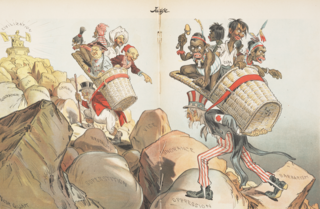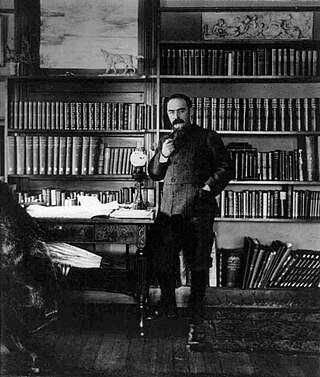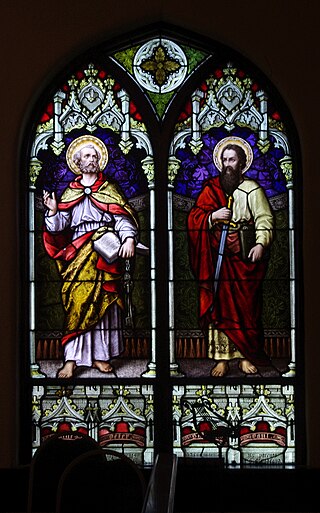
Joseph Rudyard Kipling was an English novelist, short-story writer, poet, and journalist. He was born in British India, which inspired much of his work.
This is a bibliography of works by Rudyard Kipling, including books, short stories, poems, and collections of his works.

"If—" is a poem by English writer and poet Rudyard Kipling (1865–1936), written circa 1895 as a tribute to Leander Starr Jameson. It is a literary example of Victorian-era stoicism. The poem, first published in Rewards and Fairies (1910) following the story "Brother Square-Toes", is written in the form of paternal advice to the poet's son, John.

"The White Man's Burden" (1899), by Rudyard Kipling, is a poem about the Philippine–American War (1899–1902) that exhorts the United States to assume colonial control of the Filipino people and their country. Originally written to celebrate the Diamond Jubilee of Queen Victoria, the jingoistic poem was replaced with the sombre "Recessional" (1897), also a Kipling poem about empire.

The Epistles of Horace were published in two books, in 20 BC and 14 BC, respectively.

"The Absent-Minded Beggar" is an 1899 poem by Rudyard Kipling, set to music by Sir Arthur Sullivan and often accompanied by an illustration of a wounded but defiant British soldier, "A Gentleman in Kharki", by Richard Caton Woodville. The song was written as part of an appeal by the Daily Mail to raise money for soldiers fighting in the Second Boer War and their families. The fund was the first such charitable effort for a war.

"Recessional" is a poem by Rudyard Kipling. It was composed for Queen Victoria's Diamond Jubilee, in 1897.

"Mandalay" is a poem by Rudyard Kipling, written and published in 1890, and first collected in Barrack-Room Ballads, and Other Verses in 1892. The poem is set in colonial Burma, then part of British India. The protagonist is a Cockney working-class soldier, back in grey restrictive London, recalling the time he felt free and had a Burmese girlfriend, now unattainably far away.
In the British Army, a gentleman ranker is an enlisted soldier suited through education and social background to be a commissioned officer, or indeed a former commissioned officer. Rudyard Kipling titled one of his poems, published 1892, "Gentlemen-Rankers".

Alice Caroline Kipling was one of the MacDonald sisters, Englishwomen of the Victorian era, four of whom were notable for their contribution to the arts and their marriages to well-known men. A writer and poet, she was the mother of the author Rudyard Kipling, aunt of British Prime Minister Stanley Baldwin, and sister-in-law of Edward Poynter and Edward Burne-Jones.

A copybook, or copy book is a book used in education that contains examples of handwriting and blank space for learners to imitate.

John Kipling was the only son of British author Rudyard Kipling. In the First World War, his father used his influence to get him a commission in the British Army despite being decisively rejected for poor eyesight. His death at the Battle of Loos caused his family immense grief.

"Lest we forget" is a phrase commonly used in war remembrance services and commemorative occasions in English speaking countries, specifically those connected to the British Empire. Before the term was used in reference to soldiers and war, it was first used in an 1897 Christian poem written by Rudyard Kipling called "Recessional", a poem written to commemorate Queen Victoria’s Diamond Jubilee. The phrase occurs eight times; and is repeated at the end of the first four stanzas in order to add particular emphasis regarding the dangers of failing to remember.

"To rob Peter to pay Paul", or other versions that have developed over the centuries such as "to borrow from Peter to pay Paul", and "to unclothe Peter to clothe Paul", are phrases meaning to take from one person or thing to give to another, especially when it results in the elimination of one debt by incurring another. There are many other variants and similar phrases in numerous languages. "Maneuvering the Apostles", which has the same meaning, was derived from this expression. In patchwork, "Rob Peter to pay Paul" is an alternative name for the Drunkard's Path patchwork block.

The Five Nations, a collection of poems by English writer and poet Rudyard Kipling (1865–1936), was first published in late 1903, both in the United Kingdom and the U.S.A. Some of the poems were new; some had been published before, sometimes in different versions.
A Choice of Kipling's Verse, made by T. S. Eliot, with an essay on Rudyard Kipling is a book first published in December 1941. It is in two parts. The first part is an essay by American-born British poet T. S. Eliot (1888-1965), in which he discusses the nature and stature of British poet Rudyard Kipling (1865-1936). The second part consists of Eliot's selection from Kipling's poems.
"McAndrew's Hymn" is a poem by English writer Rudyard Kipling (1865–1936). It was begun in 1893, and first published in December 1894 in Scribner's Magazine. It was collected in Kipling's The Seven Seas of 1896. Some editions title the poem "M'Andrew's Hymn".
"The Mary Gloster" is a poem by British writer Rudyard Kipling (1865-1936). It is dated 1894, but seems to have been first published in his 1896 collection The Seven Seas.

"Their name liveth for evermore" is a phrase from the King James Version of the Bible, forming the second half of a line in Ecclesiasticus or Sirach, chapter 44, verse 14, widely inscribed on war memorials since the First World War.

Known unto God is a phrase used on the gravestones of unknown soldiers in Commonwealth War Graves Commission (CWGC) cemeteries. The phrase was selected by British poet Rudyard Kipling who worked for what was then the Imperial War Graves Commission during the First World War. The origin of the phrase is unknown but it has been linked to sections of the King James Bible. The phrase was re-used for those killed during the Second World War and appears on more than 212,000 gravestones across the world. In 2013 there was controversy when it was proposed that the phrase be removed from the Tomb of the Unknown Soldier at the Australian War Memorial.















